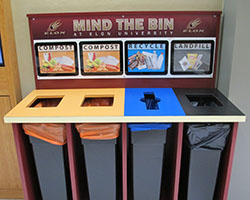Waste reduction
Waste Reduction at Elon
Elon has a goal waste reduction goal of 50% landfill diversion by 2030. Currently about 24% of the solid waste stream is recycled or composted. Elon’s Waste Reduction Master Plan includes a variety of recommendations and strategies to achieve 50% landfill diversion by 2030.
All trash, recycling and composting is managed by Environmental Services.
Learn more about waste reduction programs.
Recycling at Elon
Elon’s recycling program began in the late 1980s as a student initiative and is now managed by Environmental Services. Elon has single-stream recycling, which means all recyclables go in the same bin: glass (all types), plastic (except thin plastics), paper (all types) and metal (aluminum, steel, tin) cans. Small plastic items (smaller than 2 inches square, such as silverware) should not be placed in recycling bins. Thin plastics, such as plastic bags (grocery and sandwich), can be placed in designated bins located in each neighborhood office as well as the Moseley Center. Cardboard is recyclable and should be broken down and placed next to a recycling bin. The university also has recycling bins available for household batteries, small electronics, printer cartridges, and writing instruments. Learn more about the recycling process at Elon.
Students, faculty and staff are also able to recycle textiles, such as clothes and shoes, in designated bins located in the Moseley Center as well as each neighborhood office.
Recycling FAQs
Composting at Elon
Yard and food waste are collected and composted. When biodegradable materials are composted they are processed into a material that can be used as a soil amendment. Conversely, when biodegradable materials are placed in landfills they do not break down in the same manner and do not result in a useful product.
Yard Waste Composting
In fall 2008, Elon began collecting and composting its own yard waste in a facility located on the edge of campus. The facility closes the loop on the University’s yard waste as the final compost product is used in campus landscaping to improve soil quality and reduce water and fertilizer requirements.
Food and Biodegradable Serviceware Composting
All food waste and compostable food containers that are collected are composted in a commercial facility off-campus. Compostable serviceware is designated with the word “compostable” somewhere on the item.
Composting FAQs
Waste Reduction Programs
Mind the Bin
This is a campaign to put waste items in the correct bin so only trash, not recyclables or compostables, goes to the landfill. Bins for compost, recycling and trash are color-coded, labeled and are conveniently located next to each other in a single ‘Mind the Bin’ station. The Elon University Department of Athletics partnered with Environmental Services and the Office of Sustainability to provide ‘Mind the Bin’ stations at some athletic events and select campus locations.
Don’t Trash It!
The Don’t Trash It! campaign runs at the end of the school year and is managed by Environmental Services. It provides collection points for gently used items that would otherwise be thrown away. Various items, such as gently used furniture, working appliances, small house wares, lamps, electronics, usable clothing and non-perishable, un-opened food items are collected in designated locations. Once collected, items are donated to local non-profit organizations. Don’t Trash It! is made possible by multiple campus and community partners. Campus partners include the Kernodle Center for Civic Life, Residence Life, Environmental Services and the Office of Sustainability.
